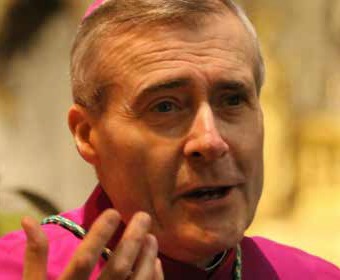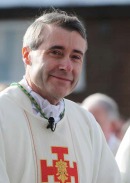
Interview with Bishop Mark Davies: A response to a call – and a look ahead
Article:
01.03.20
Interview: A response to a call – and a look ahead
Joanna Bogle talks to Bishop Mark Davies, Bishop of Shrewsbury
FAITH magazine was delighted to be able to interview Bishop Mark as the Faith Winter session drew to its close. A graduate of Durham University, Bishop Mark trained for the priesthood at Ushaw and was ordained a priest at Stockport in 1984. He served in parishes in, among other places, Swinton, Blackley and Wigan before his consecration a bishop in 2010.
You have been a warm supporter of the FAITH movement for many years. Can you tell us a bit about that?
I remember signing up to attend my first FAITH summer session as a Sixth Former back in the 1970’s. I have been delighted to see in subsequent years how new generations have found the same encouragement in their Catholic faith as I found myself as a teenager. I saw in the FAITH movement a positive approach to the orthodox Catholic faith fully in harmony with the Second Vatican Council and intellectually unafraid of the challenges of modernity. FAITH remains ready to address those challenges and provide for young Catholics solid teaching on which they can firmly base their lives and be part of the New Evangelisation. Then as now, it is a youthful movement where all of the great Christian vocations have flourished. Such spiritual fruitfulness is a clear sign of the authenticity of the approach pioneered during the past forty or fifty years. In the Faith Summer Sessions I first attended, I will always remember the spirit of prayer and the sense of community among young Catholics which I am happy to say endures to this day. One of the happy developments in the FAITH movement has been the growing number of priests, some twenty of whom concelebrated Mass with me at the recent Faith Winter Session.
Priesthood
A man’s response to a call to the priesthood is, obviously, in a sense a very personal story. But a Bishop also wants to inspire others. Tell us something about how and why you came to understand that God was calling you to be a priest.
Yes, the story of every vocation is a deeply personal one. The Lord calls a man to the priesthood at a specific moment in his life. I was 12 years of age when my Parish Priest quite unexpectedly asked me to consider this calling. It was the first time I had ever thought that I might be called to be a priest and that moment would set the course of my life. Looking back, so much helped me understand and respond to my calling, not least the faithfulness of my family and parish life. My vocational story now seems very conventional compared with the heroic paths along which men respond to this same calling today. In establishing a House of Discernment which is happily flourishing at Shrewsbury Cathedral, I was conscious of offering to new generations the same supports I knew in authentic Catholic faith, the life of prayer and devotion especially to the Blessed Sacrament and the simple atmosphere of Christian family life. These gifts helped me to first respond to my vocation almost half a century ago are now helping men in our discernment house take that same step today.
Catholic schools
A big problem for the Church in Britain is that most pupils at our Catholic secondary schools are not attending Mass with any regularity. What can be done about this?
It is terrible to contemplate the situation you describe precisely amongst those young who have been entrusted to our schools. It is a situation we can never be resigned to. The explanation seems to me very simple: many in our schools at every level do not recognise the reality of the Holy Eucharist. They have been failed either by catechesis or by the witness of family and community, in most cases by a combination of both. I remember before the celebration of a whole school Mass hearing a senior teacher tell the students he knew the next hour was going to be incredibly boring for them, yet they were still expected to behave! The most wonderful thing which ever happens on earth was within their reach and the assumption was that the miracle of love which is the Eucharist would be devoid of any interest to the young.
My own experience suggests, it is the witness of teachers and sometimes students themselves which can have the greatest effect in helping young people re-discover the wonder of the Mass and that sense of Eucharistic amazement which Saint John Paul II prayed that we would share. It is, of course, a re-discovery found in the new ecclesial movements to which the young are drawn today.
Mary’s Dowry
Do you think that the March re-dedication of England to Our Lady is of significance, or will it pass unnoticed by most people?
I think this is a truly inspired initiative to re-entrust England to the Mother of God at this hour in our history. It was my first action as Bishop to so entrust the Shrewsbury Diocese to the Immaculate Heart of Mary, a dedication which was the promise of many graces. The unique aspect of this national re-dedication is seeking to engage the greatest number of Catholics by the simplicity of the prayer and preparation proposed. It is not something the Hierarchy alone undertakes; it is a prayer to be embraced by the faithful in every part of the country. To a large extent it will be unseen and unnoticed by the mass of the population. However, I see this act as a deeply significant event in the spiritual order and one we must seek to encourage as many Catholics across England to share in. It will surely be a decisive step in the New Evangelisation of our land by so asking Our Lady to re-claim her dowry.
Recent years have seen the emergence of notable new Catholic media apostolates, including the phenomenon of EWTN, Bishop Robert Barron’s “Word on Fire”, and now Shalom TV. Will these be helpful in the New Evangelisation, or are they preaching to the converted?
The new media apostolates offer a window for a countless number to glimpse the truth and beauty of our Catholic faith. The days of public speaking on street corners may have passed yet here we see an apostolate reaching potentially into every home. It is an expression of the New Evangelisation in the newness of its methods and the ardour of its witness to the faith. However, these same apostolates also serve to build-up “the converted” in their faith which is also an essential pre-condition for the New Evangelisation. I notice the apologetic element common to these apostolates and how much we have need of such apologetics harnessing all the influence of the new media.
Culture
The everyday culture in modern Britain, especially as it relates to sexual relationships, marriage (now at an all-time low) and care of the elderly, is somewhat out of chime with Christian belief and practice. Can we hold out, and help to promote a new way ahead?
I don’t think it is a matter merely of holding out against a cultural tsunami which is presently sweeping away the foundations of British society so long based on the sanctity of marriage and family and the value of human life itself. All that is being lost will inevitably lead future generations damaged by the breakdown of family and facing old age as a barely tolerated burden to society to a sober reassessment. I am sure this will lead to a major re-evaluation of the value of marriage and the precious value of human life. I think it is vital Christians at this moment in time leave a clear and unambiguous witness to those generations who will follow us. The Youth Catechism observes that the ancient world was first converted by the witness of faithful families who formed “islands of living faith” in the midst of an unbelieving world. This is surely how the re-Christianisation of our own society will also come about and we must all be part of this.
A threat to freedom?
Is the move towards increasing imposition of political correctness a threat to the freedom of the Church? For example, in our understanding of human anthropology, the significance of differences between male and female?
We are certainly seeing growing intolerance in British society which does pose a threat to the freedom of the Church to
teach and pass on the faith. Christians can feel increasingly constrained from expressing their faith by forms of political correctness. I am told of teachers now fearful of proposing marriage as the union of man and woman. This would have been wholly unthinkable only a few years ago. Pope Francis and Pope Benedict before him, have warned of these insidious developments in western societies.
In the assault upon Christian anthropology we can never compromise the truth about the human person. In the efforts to make us conform to passing ideologies and to employ their language the space for Christian witness may be reduced. However, we must never lose sight of the highest charity in caring for the truest good of every person and recognising their dignity given by their Creator. The ideologies which have emerged in the vacuum left by Christianity may be with us for some time. However, we must be confident that the truth will ultimately win through.
And, finally: your thoughts on the 2019 canonisation of John Henry Newman. What is Newman teaching us today? Is his canonisation a sign of hope?
It was a great joy to be present at the Canonisation of Saint John Henry Newman. Seeing his portrait hanging as a banner from Saint Peter’s Basilica, it struck me there is always a providential moment when the Church raises a new saint in the sight of the whole Church and indeed the whole world. The beginning of 21st Century was to be this moment for our own Cardinal Newman. The efforts made by the Prince of Wales in travelling to Rome on the eve of the State Opening of Parliament and the equally strenuous efforts of the British Ambassador to the Holy See, seem significant. Sanctity has such a powerful attraction which reminds us how our own striving for holiness is central to the New Evangelisation, especially amid the scandals of recent history.
Every Saint is such a great sign of hope which everyone can recognise. Cardinal Newman leaves us a special legacy of teaching for these times of ours not least on the true nature of conscience; what constitutes the authentic development of Christian doctrine; and how relativism has become an insidious adversary for the Church. Above all, England’s newest Saint invites us amid the very infidelity of the times he foresaw to share his unwavering faith and confidence in the final victory of Christ and His Church.
Notes:
Joanna Bogle is editor of Faith magazine.





